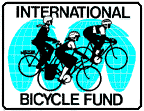 Thank
you to our friends at the International Bicycle Fund
for providing and maintaining this web site.
Thank
you to our friends at the International Bicycle Fund
for providing and maintaining this web site.Pan Africa Bicycle Information Network (PABIN)
Bikes Empower Girls and Fight AIDS in
Senegal
A New Social Marketing Tool is Born
Bicycle tours are an excellent and intimate way for the intrepid traveler to truly discover a nation and its people: freed from the physical and cultural constraints of motorized transport, one is able to experience the reality of a place.
US Peace Corps Volunteers (PCVs) in Ghana and Senegal recently applied the bicycle tour to the pressing causes of AIDS and girls' education. Ranging from 4 days to three-week long tours, each ride reached thousands of people across each region and by all accounts was wildly successful in meeting its social marketing goals.
The Senegal ride, billed the "Tour des Femmes" sought to promote education and empowerment for girls, changing attitudes that preclude girls' access to the same educational resources as boys. The spectacle of women and girls riding in the tour caused many spectators to "shake their heads in disbelief", as women and girls rarely ride bicycles in Senegal. Stephanie Altman, one of the Tour organizers, described the powerful demonstrative effect of what she described as a 'moving billboard':
While the ride's goal was to encourage girls to go to school, it also allowed village girls to see their capabilities that might have been unknown to them. Very often it is only the men who learn to ride bikes, and in turn are able to leave the village. When village populations found out it was only women riding the 240 kilometers, they were not only surprised, but in disbelief. In order for these young populations to know their capabilities, they must be exposed to their peer groups. Therefore, the girls who rode in the tour, not only verbally spread their message, but visibly inspired village girls to go to school and learn how to ride a bike.
The Ghana tour, billed as the HIV/AIDS Education Bike Ride. The weeklong event succeeded in directly reaching over 3200 Ghanaians. 42 Peace Corps Volunteers, 6 non Peace Corps volunteers, and 15 Host Country Nationals, all of whom gave talks in the towns and villages who participated in the event, led the presentations. Groups of adults and children participated through interactive activities that addressed the differences between HIV and AIDS, having compassion for those who are infected with HIV, how easily an epidemic can spread, male and female condom demonstrations, and how to make life choices that will empower one to reach their goals healthy. All information was translated into local language.
One of the organizers of the Ghana tour, Praya Baruch, captured the usefulness of bicycles in achieving effective outreach as she recounted a memorable moment that led to the growth of the tour:
When they rode into the town, wearing their "Stop AIDS Love Life" shirts, sweaty and pink faced, the villagers started cheering them on and following them to the site that they were going to give their talk. Because of that, the audience they were able to reach was much larger. They then decided to do a bike ride that would involve more volunteers and towns. Seeing a large group of people riding into the town would rally the people to listen to the talks and spark their interest in the event. [The Ride] motivates the volunteers and counterparts to go back to their own communities to start projects of their own.
From ITDP's Sustainable Transport E-Update No. 2
August 2002
Return to PABIN Homepage
 Thank
you to our friends at the International Bicycle Fund
for providing and maintaining this web site.
Thank
you to our friends at the International Bicycle Fund
for providing and maintaining this web site.